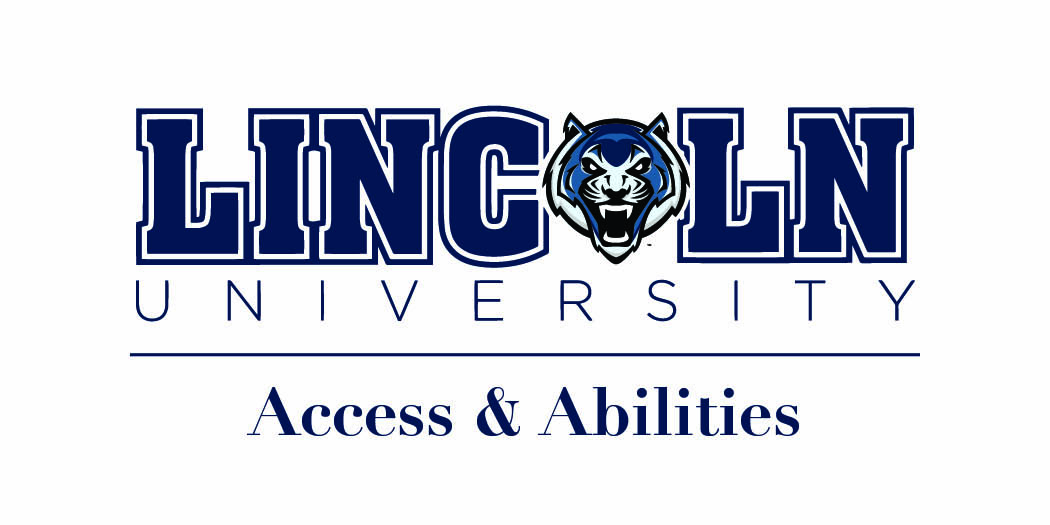Course Accommodation Policy

GUIDELINES
It is the intent of Lincoln University that all of its graduates demonstrate mastery of the competencies and successfully complete all of the specified courses required for graduation. The University recognizes that a disability may prevent a student from demonstrating competencies in math, reading, and/or writing or from successfully completing course/requirements in the same manner as would a student without a disability. The University also recognizes the need to provide accommodations for a student with a documented disability to the greatest extent possible without compromising either the student’s chosen course of study or the integrity of any student’s degree or certificate. The University also recognizes that disabilities that might preclude a student from this “same manner’ demonstration of competency or from successful course completion may be overcome by providing a combination of appropriate accommodations.
For students with verified disabilities, the following are required:
- Consistent and persistent effort in attempting to meet the requirement, including at least one attempt to complete the required course or its prerequisite, using recommended academic accommodations such as: tutorial services, note-takers, auxiliary aids, testing accommodations, and taking a self-paced course when possible. Except in those cases where the Access and Abilities Coordinator verifies that the disability in the subject area is so severe that the student has no reasonable chance of passing the required course even with accommodations.
- The following are alternatives to the completion of the required course:
- Substitution of another course: Substitution of another course or prerequisite course is permissible only if the course in question is peripheral to the student’s course of study and the student has no reasonable chance of successfully completing the required course with all of the recommended accommodations.
- Course waiver. This will be considered only when there is evidence that the student has met the above requirements by attempting and substituting and there are no viable alternatives.
- No more than one out of the three competencies may be waived for graduation.
- No more than one course (up to 5 units) may be waived.
- A waived course cannot be used as a pre-requisite for a higher level course.
In all cases, the student must demonstrate that he or she has taken advantage of all support services available to all students (e.g., tutorial services, supplemental instruction, note-taker services, auxiliary aids, testing accommodations, and slower paced versions of the same course) and that the reason for unsuccessful completion is not due to poor attendance or failure to complete class assignments or examinations. When attempting to complete the required a course, the student must demonstrate that he or she has remained in the class at least until the twelfth (12th) week.
CRITERIA
The following criteria are recommended for evaluating a student’s request:
- Documentation of disability with description of degree of educationally related functional limitations in the academic area under discussion.
- Evidence of the student’s good-faith effort to meet the graduation requirement including:
- Consistent and persistent effort in attempting course work,
- Regular attendance and completion of all assignments
- Use of all appropriate and available services, such as tutorial assistance or instructional support services, and
- Use of all appropriate and available academic adjustments, such as test accommodations.
- Evidence that the student is otherwise qualified by demonstrated success in completing course work in all other areas required for the degree.
- An explanation of how the requested substitution fulfills the intended requirement.
- Evidence that the course in question is peripheral to the student’s course of study, major, transfer goals, or employment goals, and that the student will not require further classes or training in the specified subject area.
- In case of a requested waiver, documented evidence of course attempts and course substitutions (if available).
PROCEDURE
The student will submit the following to the Access and Abilities Coordinator.
- Letter written by the student addressing the 6 criteria (1-6 above),
- Evidence from Disabilities Specialist verifying the disability and how this relates to student’s request
- Documentation of student’s academic record and requirements for graduation and evidence that the course in question is peripheral to student’s major
- Documentation from appropriate instructor(s) outlining evidence of persistent and consistent effort in attempting the course, and
- Documentation from instructional support faculty or staff outlining evidence of use of all appropriate and available services and academic adjustments.
The Coordinator will submit paperwork to the 504 Committee to determine the most appropriate course of action. For purposes of determining the appropriateness of a requested substitution or waiver, the Committee will be supplemented with (2) faculty members from the discipline where the substitution/waiver is being requested. The Chair of this augmented Committee shall be a faculty member.
The Committee will review all evidence presented by the student. The Committee’s decision will be determined by a majority vote. The Committee will forward its decision in writing to the Vice President of Academic Affairs within two weeks of receiving the original petition.

